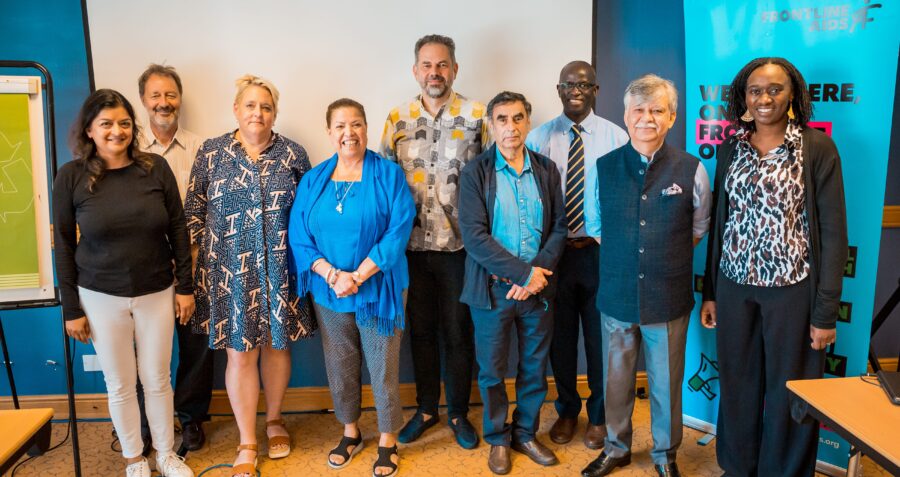Power in our partnership: ‘doing development differently’ in action

In 2022, partners co-created and established the Partnership Council, a steering committee made up of nine of our partners.
With currently over 60 members, the Frontline AIDS partnership is the world’s largest civil society partnership responding to HIV. We are multi-directional, working at local, national, regional, and global levels to deliver on the 10 actions in our shared strategy, the Global Plan of Action. We collaborate to meet our shared vision of a future free of AIDS for everyone, everywhere.
In 2021, our partnership reached more than 12.1 million people and worked with 1,592 community-based organisations around the globe.
In 2019, we set a course to further develop our partnership model, increasing the number of civil society organisations we work with in priority countries. It is this vision of a partnership that epitomises distributed leadership and shared accountability which lies at the centre of how we work.
This way of working is not new for Frontline AIDS. For over 28 years, we have continuously evolved the way we work with civil society, always seeking new ways to promote community-led action on HIV and to tap into the capacity, wisdom and knowledge that resides in the countries most affected by HIV.
The localisation and ‘doing development differently’ discourse has gained new ground in recent years, with a renewed imperative to challenge the post-colonial heritage and political and financial structures that underpin the ‘aid industry’. The Frontline AIDS partnership is well placed to drive and evidence why this move is critical for an effective global HIV response.
What is the Partnership Council?
In 2022, partners co-created and established the Partnership Council. Consisting of nine elected members from diverse partners based in multiple regions, they represent the geographical breadth of our partnership. The Partnership Council will oversee the quality, effectiveness and further evolution of the Frontline AIDS partnership, enabling us to grow and expand to new countries and areas of expertise.
Dr Sunil Mehra, Partnership Council member and Executive Director, MAMTA in India says:
[The Partnership Council] brings together cross-regional learnings for funding priorities at a national level, while putting human rights centre stage.
Following extensive discussions, the Partnership Council has identified their key concerns:
Political instability, war and crisis
From council member Andryi Klepikov from Alliance for Public Health in Ukraine, we know that the war has had a significant impact on communities living with and affected by HIV. The atrocities are well documented but it is reassuring to also see the enormous resilience of communities and the ability by APH and partners to continue supporting HIV programming and broader community responses. There are a growing number of conflicts with direct impact on communities and the work of the partnership, especially those in Ethiopia and Myanmar, leading to increasing numbers of displaced people.
For populations at risk of or affected by HIV, conflict and political unrest can lead to disruptions in prevention, care and treatment within their country, or lack of legal or practical access to treatment and care in countries of refuge. Urgent action is required by the humanitarian sector, by governments of refugee-hosting countries and within the work of the Frontline AIDS partnership.
Declining funding for HIV
The declining global attention on HIV and the impact of fewer resources at national level on marginalised populations is of great concern. Funding levels for disease-specific approaches are variable, but notably in decline in Latin America and the Caribbean, where several HIV-oriented organisations and community-led networks are struggling to continue their critical work. Funding gaps remain in all geographies to resource HIV programmes, to prevent new HIV infections and for programmes led by communities and civil society. The continuing impact of COVID-19 at national and global level also means the diversion of funds away from HIV and other health issues, leaving many programmes severely underfunded. There is need for Frontline AIDS to monitor funding flows and advocate for adequate resources to be channelled to where it matters most, including to communities.
Human Rights continue to be violated leading to poorer health outcomes
Partners note their growing concerns about the declining support for people- and rights-centered approaches, and the growing political tolerance for discriminatory language and practices against marginalised populations. This is evident not only in the continuous human rights violations of marginalised populations but in increases in gender-based violence; the renewed attacks on women’s rights to bodily autonomy, and evidence of growing conservatism when promoting comprehensive sexuality education. These attacks on human rights are realities across diverse geographies and negatively impact HIV prevention programmes.
Dr Edgar Valdez, Partnership Council member and Executive Director, Instituto Para El Desarrallo Humano in Bolivia, says:
The results [of the erosion of human rights] are discrimination, stigma and violence against key populations due to prejudices and stereotypes about sexuality.
The need for meaningful youth engagement
There is a need for a stronger presence and participation of young people affected by HIV in all of the work, including the governance, of the Frontline AIDS partnership. Partners re-confirm their commitment to support the growth of the next generation of community leaders.
Tags
Adolescent girls and young womenCOVID-19Doing development differentlyGender-based violenceHIV preventionPartnershipPeople who are marginalised

